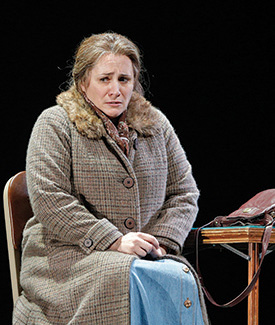marke@sfbg.com
STAGE Oh, the drama. Three weeks before Dolores Claiborne — the 1992 Stephen King thriller transformed by composer Tobias Picker and librettist JD McClatchy into a two-and-a-half-hour opera — was set to premiere, mezzo-soprano Dolora Zadjic bowed out, citing knee problems. She was singing Dolores. Whoever could learn this exhausting part (Dolores is onstage almost every scene, singing up a storm) in 21 days?
By divine luck, gifted and game soprano Patricia Racette was here to perform in another SF Opera production, Arrigo Boito’s 1867 Mefistofele. (Don’t miss it: the 30-minute witches’ sabbath/orgy scene featuring an entire writhing, nude-suited chorus is glorious.) Racette burst unannounced into the packed press conference addressing her acceptance of the part, a tornado of scarves, with a loud, “Speak of the devil!” She had sung Picker’s music before, in previous operas An American Tragedy and Emmeline. She was quick to pick things up. And how different was a mezzo-soprano from a soprano, anyway?
As it turns out, quite a bit. Right off the bat, I will say the Sept. 18 premiere of the opera was energetic, disturbing, visually stunning, and, at several moments, ethereally beautiful. All your favorite lines are there (“I get to say ‘bitch’ and ‘shit’!” Racette exclaimed with glee at the presser), although the cuss words don’t make it to the supertitles, so delicate are we. The fantastic cast members sang for their lives, and conductor George Manahan led the orchestra nimbly through the thicket of Picker’s score, which held several delightful surprises, including eerie whistles and shivery cinematic effects. The staging was brilliant — using video projections and multiple-tier trickery, a series of sets within sets opened up, playing off the story’s flashback-filled timeline.
And Racette nails it, although she’s more comfortable in high dudgeon as vengeful fury than as stone-faced martyr. As King wrote it, this tragedy of a feisty Maine woman burdened with misfortune and accident is an affecting character study set in an atmosphere of uncanny dread and dark humor. Yet Picker and McClatchy have decided to focus on plot, rather than psychological complexity. There really isn’t too much plot here, though, so we get a lot of repetition. And what plot there is sometimes twists and shocks, but it’s not particularly expansive or enlightening. Feminist attitudes are struck, but everyone’s a feminist when it comes to a woman being beaten by an icky husband (macho, well-voiced Wayne Tiggs) who’s sexually molesting her sweet daughter (the wonderful Susannah Biller, who kills it in an unhinged aria). That molestation is strikingly staged, Dolores’ revenge is exacted during an eclipse, and there’s a bit of mystery about some money and another death, which is tidily cleared up.
But the real action’s in the vertiginous moods of the tale, and Picker’s score can’t seem to find them. Picker’s part of a generation of American composers that traffics unselfconsciously in cinematic horror, high camp, tacky Americana, and other contemporary modes, but that doesn’t mean he’s necessarily good at all of them. I think Dolores’ imperious, ill-fated employer, Vera Donovan (Elizabeth Futral, giving her all, singing “Sometimes being a bitch is all a woman has to hold on to”) is meant to be part Norma Desmond, part Nancy Reagan, but she ends up more kitsch than camp — mostly because she’s near-shrieking all the time.
Here’s the only real problem with a production that may have been colored by shaky nerves. Often there are three sopranos — Vera, Dolores, and the daughter, Selena — tearing up the stage. That could be awesome (who doesn’t love three anguished sopranos in an eclipse) but the vocal lines are so cartoonish at times that they seem more parody of opera-singing than a natural extension of the drama. Every exclamation is punctuated by high note after high note, like a DJ dropping all the builds and going directly for the breakdowns. Dolores Claiborne is juicy and in many ways a triumph. And it will surely draw new audiences to the opera (opening night was bursting with gothic youth). They’ll probably love it. But I’m afraid that their stereotypes about what opera sounds like might be confirmed.
DOLORES CLAIBORNE runs through Oct. 4. www.sfopera.com

